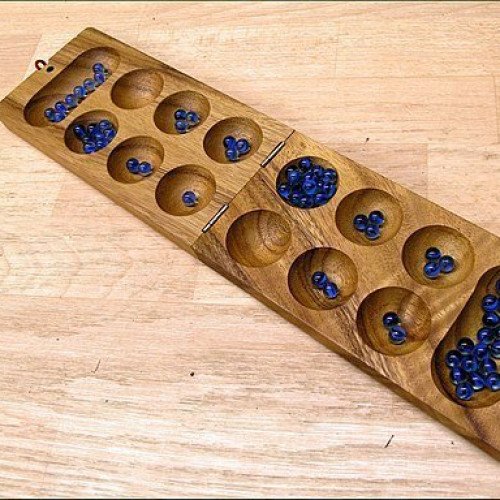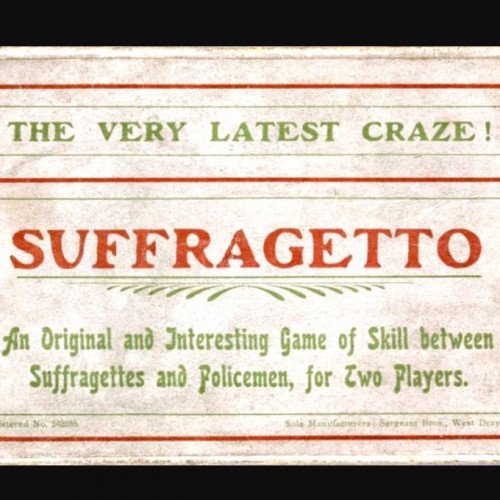KALAH VS SUFFRAGETTO

KALAH
Kalah, also called Kalaha or Mancala, is a game in the mancala family invented in the United States by William Julius Champion, Jr. in 1940. This game is sometimes also called "Kalahari", possibly by false etymology from the Kalahari desert in Namibia. As the most popular and commercially available variant of mancala in the West, Kalah is also sometimes referred to as Warri or Awari, although those names more properly refer to the game Oware. For most of its variations, Kalah is a solved game with a first-player win if both players play perfect games. The Pie rule can be used to balance the first-player's advantage. Mark Rawlings has written a computer program to extensively analyze both the "standard" version of Kalah and the "empty capture" version, which is the primary variant. The analysis was made possible by the creation of the largest endgame databases ever made for Kalah. They include the perfect play result of all 38,902,940,896 positions with 34 or fewer seeds. In 2015, for the first time ever, each of the initial moves for the standard version of Kalah(6,4) and Kalah(6,5) have been quantified: Kalah(6,4) is a proven win by 8 for the first player and Kalah(6,5) is a proven win by 10 for the first player. In addition, Kalah(6,6) with the standard rules has been proven to be at least a win by 4. Further analysis of Kalah(6,6) with the standard rules is ongoing. For the "empty capture" version, Geoffrey Irving and Jeroen Donkers (2000) proved that Kalah(6,4) is a win by 10 for the first player with perfect play, and Kalah(6,5) is a win by 12 for the first player with perfect play. Anders Carstensen (2011) proved that Kalah(6,6) was a win for the first player. Mark Rawlings (2015) has extended these "empty capture" results by fully quantifying the initial moves for Kalah(6,4), Kalah(6,5), and Kalah(6,6). With searches totaling 106 days and over 55 trillion nodes, he has proven that Kalah(6,6) is a win by 2 for the first player with perfect play. This was a surprising result, given that the "4-seed" and "5-seed" variations are wins by 10 and 12, respectively. Kalah(6,6) is extremely deep and complex when compared to the 4-seed and 5-seed variations, which can now be solved in a fraction of a second and less than a minute, respectively.
Statistics for this Xoptio

SUFFRAGETTO
Suffragetto was a board game published in the United Kingdom around 1908 by the Women's Social and Political Union (WSPU) and manufactured by Sargeant Bros. Ltd. In modern terms, it was developed to "enact feminist ideology in a hybrid fantasy-real world environment" to support the activist strategies of the suffragettes. The game is a contest of occupation featuring two players around a grid board representing the streets of Edwardian London. One player plays 21 green markers as the radical suffragettes, the other player plays 21 dark blue markers as the police constables. The objective of the suffragettes is to break through police lines and enter the House of Commons, while at the same time preventing the police from entering Albert Hall. The objective of the police is to disrupt the meeting of the suffragettes by entering Albert Hall, while at the same time preventing them from entering the House of Commons. "Arrested" suffragettes are confined to the "prison" section of the board, whereas "disabled" constables are confined to the "hospital" section. The game is won by the first player who introduces six markers into the opponent's base. The WSPU were enthusiastic about manufacturing and selling the game, as it would allow the organisation to continue running without having to depend on donations from wealthy individuals. Oxford's Bodleian Libraries has the only known surviving copy of the game. Suffragetto was among several children's games designed at that time around the themes of gender, resistance, and social relationships, along with the contemporaneous games Panko and Pank-a-Squith (1909). The goal of the latter was to navigate a suffragette (led by Emmeline Pankhurst) down a long path from her home to parliament, past obstacles placed by the Liberal government (led by Prime Minister H. H. Asquith).